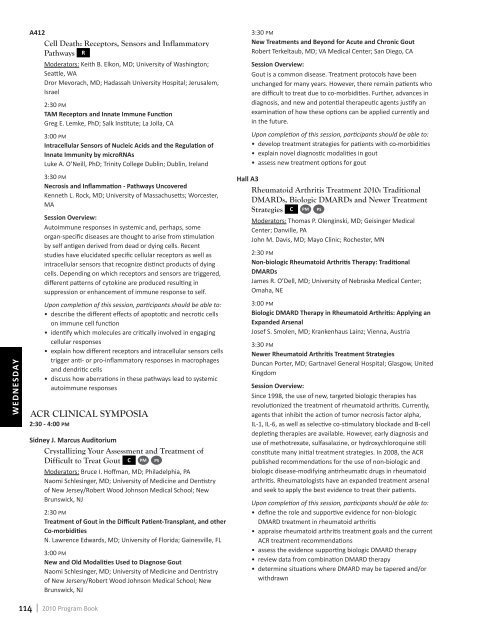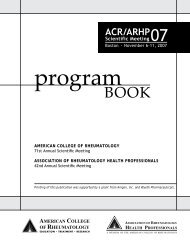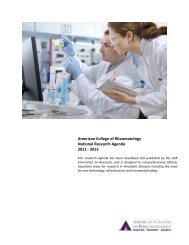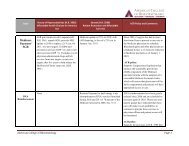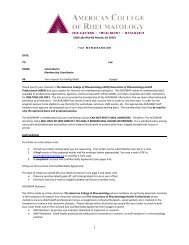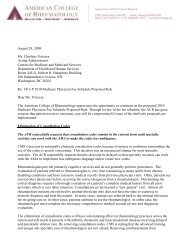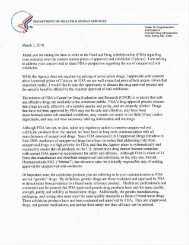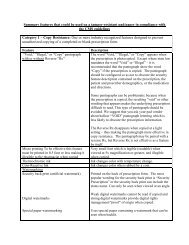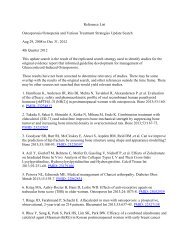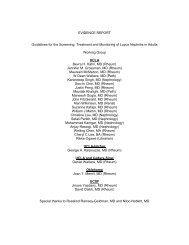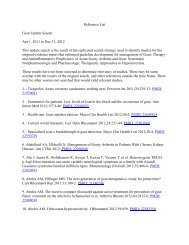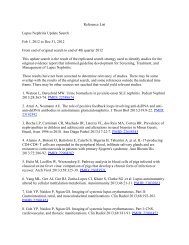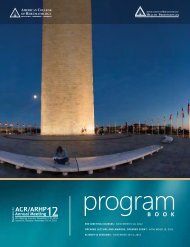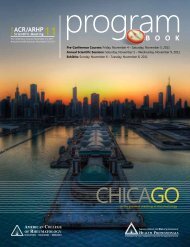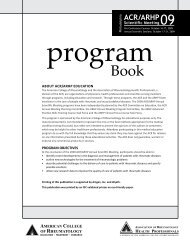A412 Cell Death: Receptors, Sensors and Inflammatory Pathways R Moderators: Keith B. Elkon, MD; University <strong>of</strong> Washington; Seattle, WA Dror Mevorach, MD; Hadassah University Hospital; Jerusalem, Israel 2:30 PM TAM Receptors and Innate Immune Function Greg E. Lemke, PhD; Salk Institute; La Jolla, CA 3:00 PM Intracellular Sensors <strong>of</strong> Nucleic Acids and the Regulation <strong>of</strong> Innate Immunity by microRNAs Luke A. O’Neill, PhD; Trinity <strong>College</strong> Dublin; Dublin, Ireland 3:30 PM Necrosis and Inflammation - Pathways Uncovered Kenneth L. Rock, MD; University <strong>of</strong> Massachusetts; Worcester, MA Session Overview: Autoimmune responses in systemic and, perhaps, some organ-specific diseases are thought to arise from stimulation by self antigen derived from dead or dying cells. Recent studies have elucidated specific cellular receptors as well as intracellular sensors that recognize distinct products <strong>of</strong> dying cells. Depending on which receptors and sensors are triggered, different patterns <strong>of</strong> cytokine are produced resulting in suppression or enhancement <strong>of</strong> immune response to self. 3:30 PM New Treatments and Beyond for Acute and Chronic Gout Robert Terkeltaub, MD; VA Medical Center; San Diego, CA Session Overview: Gout is a common disease. Treatment protocols have been unchanged for many years. However, there remain patients who are difficult to treat due to co-morbidities. Further, advances in diagnosis, and new and potential therapeutic agents justify an examination <strong>of</strong> how these options can be applied currently and in the future. Upon completion <strong>of</strong> this session, participants should be able to: • develop treatment strategies for patients with co-morbidities • explain novel diagnostic modalities in gout • assess new treatment options for gout Hall A3 Rheumatoid Arthritis Treatment 2010: Traditional DMARDs, Biologic DMARDs and Newer Treatment Strategies C PM PS Moderators: Thomas P. Olenginski, MD; Geisinger Medical Center; Danville, PA John M. Davis, MD; Mayo Clinic; Rochester, MN 2:30 PM Non-biologic Rheumatoid Arthritis Therapy: Traditional DMARDs James R. O’Dell, MD; University <strong>of</strong> Nebraska Medical Center; Omaha, NE wednesday Upon completion <strong>of</strong> this session, participants should be able to: • describe the different effects <strong>of</strong> apoptotic and necrotic cells on immune cell function • identify which molecules are critically involved in engaging cellular responses • explain how different receptors and intracellular sensors cells trigger anti- or pro-inflammatory responses in macrophages and dendritic cells • discuss how aberrations in these pathways lead to systemic autoimmune responses ACR Clinical Symposia 2:30 - 4:00 PM Sidney J. Marcus Auditorium Crystallizing Your Assessment and Treatment <strong>of</strong> Difficult to Treat Gout C PM PS Moderators: Bruce I. H<strong>of</strong>fman, MD; Philadelphia, PA Naomi Schlesinger, MD; University <strong>of</strong> Medicine and Dentistry <strong>of</strong> New Jersey/Robert Wood Johnson Medical School; New Brunswick, NJ 2:30 PM Treatment <strong>of</strong> Gout in the Difficult Patient-Transplant, and other Co-morbidities N. Lawrence Edwards, MD; University <strong>of</strong> Florida; Gainesville, FL 3:00 PM New and Old Modalities Used to Diagnose Gout Naomi Schlesinger, MD; University <strong>of</strong> Medicine and Dentristry <strong>of</strong> New Jersery/Robert Wood Johnson Medical School; New Brunswick, NJ 3:00 PM Biologic DMARD Therapy in Rheumatoid Arthritis: Applying an Expanded Arsenal Josef S. Smolen, MD; Krankenhaus Lainz; Vienna, Austria 3:30 PM Newer Rheumatoid Arthritis Treatment Strategies Duncan Porter, MD; Gartnavel General Hospital; Glasgow, United Kingdom Session Overview: Since 1998, the use <strong>of</strong> new, targeted biologic therapies has revolutionized the treatment <strong>of</strong> rheumatoid arthritis. Currently, agents that inhibit the action <strong>of</strong> tumor necrosis factor alpha, IL-1, IL-6, as well as selective co-stimulatory blockade and B-cell depleting therapies are available. However, early diagnosis and use <strong>of</strong> methotrexate, sulfasalazine, or hydroxychloroquine still constitute many initial treatment strategies. In 2008, the ACR published recommendations for the use <strong>of</strong> non-biologic and biologic disease-modifying antirheumatic drugs in rheumatoid arthritis. Rheumatologists have an expanded treatment arsenal and seek to apply the best evidence to treat their patients. Upon completion <strong>of</strong> this session, participants should be able to: • define the role and supportive evidence for non-biologic DMARD treatment in rheumatoid arthritis • appraise rheumatoid arthritis treatment goals and the current ACR treatment recommendations • assess the evidence supporting biologic DMARD therapy • review data from combination DMARD therapy • determine situations where DMARD may be tapered and/or withdrawn 114 2010 Program Book
ACR Concurrent Abstract Sessions 2:30 - 4:00 PM A402 Epidemiology and Health Services Research: Osteoarthritis Moderators: John D. FitzGerald, MD, PhD; University <strong>of</strong> California-Los Angeles School <strong>of</strong> Medicine Rehabilitation; Los Angeles, CA Elena Losina, PhD; Brigham and Women’s Hospital; Boston, MA 2:30 PM 2090. Quality-Adjusted Life Expectancy Losses Due to Disparities in Total Knee Replacement (TKR) Offer and Acceptance Rates in African <strong>American</strong> (AA) Men and Women. Elena Losina 4 , Lisa G. Suter 6 , Alexander M. Weinstein 2 , Ilya Golovaty 2 , William M. Reichmann 3 , Sara A. Burbine 2 , Edward H. Yelin 5 and Jeffrey N. Katz 1 , 1Brigham & Womens Hosp, Boston, MA, 2 Brigham and Women’s Hospital, 3 Brigham and Women’s Hospital, Boston University, Boston, MA, 4 Brigham and Women’s Hospital, Boston University, Harvard Medical School, 5 University <strong>of</strong> California, San Francisco, CA, 6 Yale University, New Haven, CT 2:45 PM 2091. Age <strong>of</strong> Symptomatic Knee OA Onset: Impact on Costs and Quality <strong>of</strong> Life. Elena Losina 5 , William M. Reichmann 3 , Ilya Golovaty 2 , Edward H. Yelin6, Hanna Gerlovin 2 , Elizabeth A. Wright 2 , David J. Hunter 7 , Daniel H. Solomon 4 and Jeffrey N. Katz 1 , 1 Brigham & Womens Hosp, Boston, MA, 2 Brigham and Women’s Hospital, 3 Brigham and Women’s Hospital, Boston University, Boston, MA, 4 Brigham and Women’s Hospital, Harvard Medical School, 5 Brigham and Womens Hospital, Boston, MA, 6 University <strong>of</strong> California, San Francisco, CA, 7 University <strong>of</strong> Sydney 3:00 PM 2092. Projecting Lifetime Risk <strong>of</strong> Symptomatic Knee OA and Total Knee Replacement (TKR) in Persons Sustaining a Complete Anterior Cruciate Ligament (ACL) Tear in Early Adulthood. Elena Losina 4 , Hanna Gerlovin 2 , Lisa G. Suter 7 , David J. Hunter 6 , Sara A. Burbine 2 , William M. Reichmann 5 , Laurel Donnell-Fink 2 , Daniel Hal Solomon 3 and Jeffrey N. Katz 1 , 1 Brigham & Womens Hosp, Boston, MA, 2 Brigham and Women’s Hospital, 3 Brigham and Womens Hospital, Boston, MA, 4 Brigham and Womens Hospital, Boston, MA, 5 Brigham and Womens Hospital, Boston University, Boston, MA, 6 University <strong>of</strong> Sydney, 7 Yale University, New Haven, CT 3:15 PM 2093. Validation <strong>of</strong> an Internet-Based Questionnaire for Ascertaining Cases <strong>of</strong> Hip and Knee Osteoarthritis. Charles R. Ratzlaff 2 , Jacek Kopec 2 and Mieke Koehoorn 1 , 1 University <strong>of</strong> British Columbia, 2 University <strong>of</strong> British Columbia / Arthritis Research Centre <strong>of</strong> Canada 3:30 PM 2094. Prevalence <strong>of</strong> Symptomatic Knee and Hip OA: A Population-Based Survey in France. Francis Guillemin 4 , Anne-Christine Rat 5 , Bernard Mazières 10 , Jacques Pouchot 6 , Liana Euller Ziegler 8 , Bruno Fautrel 11 , Patrice Fardellone 3 , Johanne Morvan 9 , Christian H. Roux 8 , Evelyne Verrouil 2 , Alain Saraux 1 , Joel Coste 7 and (the KHOALA Group), 1 Brest University, Brest, France, 2 C.H.U Toulouse, Toulouse, France, 3 INSERM ERI 12, C.H.U Amiens, Amiens, France, 4 INSERM, CIC-EC CIE6, Nancy-Université, Paul Verlaine Metz, Paris Descartes, EA 4360 Apemac, Vandoeuvre les Nancy, France, 5 INSERM, CIC-EC CIE6, Nancy-Université, Paul Verlaine Metz, Paris Descartes, EA 4360 Apemac, Nancy, France, 6 Nancy-Université, Paul Verlaine Metz, Paris Descartes, EA 4360 Apemac, Toulouse, France, 7 Nancy-Université, Paul Verlaine Metz, Paris Descartes, EA 4360 Apemac, Paris, France, 8 Nice- University, Nice, France, 9 Quimper Hospital, Quimper, France, 10 Toulouse-University, Toulouse, France, 11 UPMC, C.H.U Pitie Salpetriere, Paris, France 3:45 PM 2095. Modifiable Predictors <strong>of</strong> Racial Differences in Gait Velocity in an Elderly Urban Cohort. Irene Blanco 2 , Joe Verghese 2 , Richard B. Lipton 2 , Chaim Putterman 1 and Carol A. Derby 2 , 1 Albert Einstein <strong>College</strong> <strong>of</strong> Med, Bronx, NY, 2 Albert Einstein <strong>College</strong> <strong>of</strong> Medicine, Bronx, NY A311 Osteoarthritis - Clinical Aspects: Pain and Biomechanics Moderators: Joel A. Block, MD; Rush University Medical Center; Chicago, IL Gillian A. Hawker, MD, MSc; Women’s <strong>College</strong> Hospital; Toronto, ON, Canada 2:30 PM 2096. Physical Activity Assessed by Accelerometry in Persons with Knee OA Compared to National Guidelines: The Osteoarthritis Initiative (OAI). Dorothy D. Dunlop 6 , Jing Song 5 , Pamela Semanik 8 , Leena Sharma5, Rowland W. Chang 4 , Joan M. Bathon 3 , Charles Eaton 1 , Marc C. Hochberg 11 , W. Jerry Mysiw 7 , Rebecca Jackson 7 , C. Kent Kwoh 10 , Michael C. Nevitt 9 and Jennifer M. Hootman 2 , 1 Brown University, 2 Centers for Disease Control, Kennesaw, GA, 3 Johns Hopkins Univ Ste, Baltimore, MD, 4 Northwestern Univ, Chicago, IL, 5 Northwestern University, Chicago, IL, 6 Northwestern University Medical School, Chicago, IL, 7 Ohio State University, 8 Rehabilitation Institute <strong>of</strong> Chicago, Chicago, IL, 9 UCSF, San Francisco, CA, 10 Univ <strong>of</strong> Pittsburgh, Pittsburgh, PA, 11 University <strong>of</strong> Maryland, Baltimore, MD 2:45 PM 2097. Brain Activity in Patients with Chronic Knee Pain Due to Osteoarthritis: Dissociating Evoked from Spontaneous Pain. Elle L. Parks 2 , Marwan N. Baliki 2 , Paul Y. Geha 3 , Thomas J. Schnitzer 1 and Apkar V. Apkarian 2 , 1 Northwestern University, Chicago, IL, 2 Northwestern University, 3 Yale University 3:00 PM 2098. Central Sensitization and Knee Pain in Osteoarthritis: Preliminary Results from the MOST Study. Tuhina Neogi 3 , Jingbo Niu 4 , Lars Arendt-Nielsen 1 , Joachim Scholz 2 , Laura Frey-Law 9 , Clifford Woolf 2 , Yuqing Zhang 4 , Larry Bradley 8 , Irina Tolstykh 7 , Michael C. Nevitt 6 and David T. Felson 5 , 1 Aalborg University, Denmark, 2 Boston Childrens Hospital, 3 Boston Univ Schl <strong>of</strong> Med, Boston, MA, 4 Boston Univ School <strong>of</strong> Medicine, Boston, MA, 5 Boston University School <strong>of</strong> Medicine, Boston, MA, 6 UCSF, San Francisco, CA, 7 UCSF, 8 University <strong>of</strong> Alabama at Birmingham, 9 University <strong>of</strong> Iowa 2010 Program Book 115 wednesday
- Page 1 and 2:
program B O O K Pre-Conference Cour
- Page 3 and 4:
program B O O K ABOUT ACR/ARHP EDUC
- Page 5 and 6:
TABLE OF CONTENTS ACCREDITATION . .
- Page 7 and 8:
TABLE OF CONTENTS ACR/ARHP Poster S
- Page 9 and 10:
TABLE OF CONTENTS Systemic Sclerosi
- Page 11 and 12:
the written consent of the ACR is p
- Page 13 and 14:
Shuttle Bus Service See shuttle sig
- Page 15 and 16:
ACR Resource Center Hours: Sunday,
- Page 17 and 18:
ACR Hotels + Map Complimentary shut
- Page 19 and 20:
to the premier meeting in rheumatol
- Page 21 and 22:
ACR Clinical Research Conference c/
- Page 23 and 24:
4:20 PM Germinal Center Reactions A
- Page 25 and 26:
3:30 PM Live Demonstration: Ultraso
- Page 27 and 28:
Upon completion of this session, pa
- Page 29 and 30:
MONDAY, NOVEMBER 8, 2010 ACR/ARHP R
- Page 31 and 32:
B301 Dermatological Manifestations
- Page 33 and 34:
Session Overview: The innate immune
- Page 35 and 36:
Upon completion of this session, pa
- Page 37 and 38:
B308 Inflammatory Eye Disease P/C M
- Page 39 and 40:
and insufficiency • recall source
- Page 41 and 42:
Session Overview: The advent of bio
- Page 43 and 44:
2:45 pm 641. Major Improvements in
- Page 45 and 46:
5 University of Twente and Medisch
- Page 47 and 48:
ACR/ARHP Combined Abstract Session
- Page 49 and 50:
REF 25th Anniversary Celebration 2:
- Page 51 and 52:
5:45 PM 699. Defining Latent and/or
- Page 53 and 54:
Lilian H. D. van Tuyl 8 , Karin Bri
- Page 55 and 56:
ACR REF Special Sessions 4:30 - 6:0
- Page 57 and 58:
REF 5K Run/Walk 6:00 - 8:00 am See
- Page 59 and 60:
• discuss the principles of early
- Page 61 and 62:
ACR Medical Aspects of Rheumatic Di
- Page 63 and 64:
10:00 am 1349. Work as a Daily Chal
- Page 65 and 66: ACR Plenary Session II: Discovery 2
- Page 67 and 68: B210 B301 Pediatrics: Periodic Feve
- Page 69 and 70: Session Overview: As a clinical edu
- Page 71 and 72: Thomas J. Murphy Ballroom Giant Cel
- Page 73 and 74: 3:45 PM 1367. Serum Urate Levels in
- Page 75 and 76: A411 Rheumatoid Arthritis - Human E
- Page 77 and 78: 2:45 PM 1405. Development of a Visi
- Page 79 and 80: 4:30 PM Anti-citrullinated Protein
- Page 81 and 82: of Experimental Orthopedics, Univer
- Page 83 and 84: 5:30 PM 1438. Mortality/Morbidity i
- Page 85 and 86: 5:30 PM 1456. Belimumab, a BLyS-Spe
- Page 87 and 88: Develly 5 , Bernardo L. F. Fernande
- Page 89 and 90: 7:30 PM Role of IL-1 in Human Artic
- Page 91 and 92: • compare the prevalence and epid
- Page 93 and 94: 6:45 PM Macrophage Activation Syndr
- Page 95 and 96: Upon completion of this session, pa
- Page 97 and 98: Session Overview: This roundtable d
- Page 99 and 100: B303 Scleroderma: Systemic Sclerosi
- Page 101 and 102: 9:00 - 10:30 am - Poster Hall Morni
- Page 103 and 104: • describe the role of IL-1 and I
- Page 105 and 106: Session Overview: For the clinician
- Page 107 and 108: • identify the aspects for day-to
- Page 109 and 110: ACR Study Groups 1:00 - 2:00 PM B30
- Page 111 and 112: Session Overview: Ultrasound and ma
- Page 113 and 114: Session Overview: Fifty percent of
- Page 115: 1:20 PM Academic Rheumatology Seth
- Page 119 and 120: 3:00 PM 2110. Rheumatologists on th
- Page 121 and 122: 2:45 PM 2133. Reasons for Decline i
- Page 123 and 124: Session Overview: We are witnessing
- Page 125 and 126: Session Overview: Systemic sclerosi
- Page 127 and 128: Oaks, CA, 2 Amgen Inc., San Francis
- Page 129 and 130: 5:00 PM 2176. A Role of Autoimmune
- Page 131 and 132: 4:30 PM 2198. Association between V
- Page 133 and 134: ARHP Concurrent Sessions 4:30 - 6:0
- Page 135 and 136: THURSDAY, NOVEMBER 11, 2010 ACR/ARH
- Page 137 and 138: • apply these basic statistics to
- Page 139 and 140: 9:15 AM The ACR/EULAR Definition of
- Page 141 and 142: Immunology, Oslo University Hospita
- Page 143 and 144: 9:15 AM 2239. Factors Associated wi
- Page 145 and 146: Upon completion of this session, pa
- Page 147 and 148: Mikkel Østergaard 6 , Paul Emery 4
- Page 149 and 150: Ende 4 , 1 Department of Rheumatolo
- Page 151 and 152: ACR Poster Session A Cytokines, Med
- Page 153 and 154: ACR Poster Session A 51. Associatio
- Page 155 and 156: ACR Poster Session A 83. Respirator
- Page 157 and 158: ACR Poster Session A 121. Bone Dens
- Page 159 and 160: ACR Poster Session A 142. The Intra
- Page 161 and 162: ACR Poster Session A 171. Early Pro
- Page 163 and 164: ACR Poster Session A Pediatric Rheu
- Page 165 and 166: ACR Poster Session A 233. Prevalenc
- Page 167 and 168:
ACR Poster Session A 266. Subtype S
- Page 169 and 170:
ACR Poster Session A 297. Body Weig
- Page 171 and 172:
ACR Poster Session A 325. Patient R
- Page 173 and 174:
ACR Poster Session A 356. Influence
- Page 175 and 176:
ACR Poster Session A 383. Efficacy
- Page 177 and 178:
ACR Poster Session A 409. Rituximab
- Page 179 and 180:
ACR Poster Session A 441. Recombina
- Page 181 and 182:
ACR Poster Session A 465. Immunoglo
- Page 183 and 184:
ACR Poster Session A 496. IRF8 Alle
- Page 185 and 186:
ACR Poster Session A 521. DC-STAMP
- Page 187 and 188:
ACR Poster Session A 546. Prevalenc
- Page 189 and 190:
ACR Poster Session A 571. Epidemiol
- Page 191 and 192:
ACR Poster Session A 599. Validatio
- Page 193 and 194:
ACR/ARHP Poster Session B Halls B1
- Page 195 and 196:
ACR Poster Session B 767. Economic
- Page 197 and 198:
ACR/ARHP Poster Session B 792. The
- Page 199 and 200:
ACR/ARHP Poster Session B Universit
- Page 201 and 202:
ACR/ARHP Poster Session B 848. Cell
- Page 203 and 204:
ACR/ARHP Poster Session B 886. Scre
- Page 205 and 206:
ACR/ARHP Poster Session B 909. Regu
- Page 207 and 208:
ACR/ARHP Poster Session B 935. The
- Page 209 and 210:
ACR/ARHP Poster Session B 967. Frac
- Page 211 and 212:
ACR Poster Session B 993. Early Exp
- Page 213 and 214:
ACR/ARHP Poster Session B 1022. Com
- Page 215 and 216:
ACR/ARHP Poster Session B 1055. Son
- Page 217 and 218:
ACR Poster Session B 1084. Gene Exp
- Page 219 and 220:
ACR/ARHP Poster Session B 1111. Inc
- Page 221 and 222:
ACR Poster Session B hiroshima Memo
- Page 223 and 224:
ACR/ARHP Poster Session B 1166. Pre
- Page 225 and 226:
ACR/ARHP Poster Session B 1199. Typ
- Page 227 and 228:
ACR/ARHP Poster Session B 1225. Phy
- Page 229 and 230:
ACR/ARHP Poster Session B 1262. Lat
- Page 231 and 232:
ACR/ARHP Poster Session B 1294. End
- Page 233 and 234:
ACR/ARHP Poster Session B 1321. Cha
- Page 235 and 236:
ACR/ARHP Poster Session C Halls B1
- Page 237 and 238:
ACR/ARHP Poster Session C 1495. S10
- Page 239 and 240:
ACR/ARHP Poster Session C 1524. Inc
- Page 241 and 242:
ACR/ARHP Poster Session C 1555. Pro
- Page 243 and 244:
ACR/ARHP Poster Session C 1583. Ass
- Page 245 and 246:
ACR/ARHP Poster Session C 1596. Gen
- Page 247 and 248:
ACR/ARHP Poster Session C 1622. Flu
- Page 249 and 250:
ACR/ARHP Poster Session C Miscellan
- Page 251 and 252:
ACR/ARHP Poster Session C L. Woodwa
- Page 253 and 254:
ACR/ARHP Poster Session C 1692. Res
- Page 255 and 256:
ACR/ARHP Poster Session C 1719. Los
- Page 257 and 258:
ACR/ARHP Poster Session C 1749. Con
- Page 259 and 260:
ACR/ARHP Poster Session C 1780. Tow
- Page 261 and 262:
ACR/ARHP Poster Session C 1804. Eff
- Page 263 and 264:
ACR/ARHP Poster Session C Immunolog
- Page 265 and 266:
ACR/ARHP Poster Session C 2 Departm
- Page 267 and 268:
ACR/ARHP Poster Session C CA, 29 Un
- Page 269 and 270:
ACR/ARHP Poster Session C 1900. IL-
- Page 271 and 272:
ACR/ARHP Poster Session C 1930. Cor
- Page 273 and 274:
ACR/ARHP Poster Session C 1958. The
- Page 275 and 276:
ACR/ARHP Poster Session C 1988. Cha
- Page 277 and 278:
ACR/ARHP Poster Session C 2015. CpG
- Page 279 and 280:
ACR/ARHP Poster Session C 2038. Pri
- Page 281 and 282:
ACR/ARHP Poster Session C 2070. Ass
- Page 283 and 284:
REF Industry Roundtable-supported S
- Page 285 and 286:
REF Industry Roundtable-supported S
- Page 287 and 288:
INDUSTRY-SUPPORTED POST-CONFERENCE
- Page 289 and 290:
2010 ACR/ARHP Annual Meeting Leader
- Page 291 and 292:
2010 ACR/ARHP Annual Meeting Leader
- Page 293 and 294:
FLOOR PLANS 2010 Program Book 291
- Page 295 and 296:
VISIT THE EXHIBIT HALL New and inno
- Page 297 and 298:
EXHIBITORS La Lettre Du Rhumatologu
- Page 299 and 300:
ACKNOWLEDGEMENTS The ACR, the ARHP
- Page 301 and 302:
ACR/ARHP/REF STAFF LISTING Administ
- Page 303 and 304:
A Ahmed, Rafi, PhD T cell Memory .
- Page 305 and 306:
Cooper, Max D, MD Introduction . .
- Page 307 and 308:
Gerlag, Danielle Marie, MD, PhD The
- Page 309 and 310:
Physical Examination Skills for Imp
- Page 311 and 312:
Meroni, Pierluigi, MD Autoantibodie
- Page 313 and 314:
Rogers, Joan C, PhD, OTR/ L Underst
- Page 315 and 316:
Terkeltaub, Robert, MD Crystallizin
- Page 317 and 318:
A Aarden, L 1825 Aarrass, S 1519, 1
- Page 319 and 320:
Bakker, AAB 1095 Barendregt, B 753
- Page 321 and 322:
Boutin-Le Thi Huong, D 478 Bout-Tab
- Page 323 and 324:
Chatham, WW 457, 1146, 1454, 1457,
- Page 325 and 326:
Daudon, M 875 Daugas, E 2009 Davatc
- Page 327 and 328:
Ehst, B 758 Eicher, JL 688 Eisen, S
- Page 329 and 330:
Gabay, OH 1484 Gaber, T 630, 1418 G
- Page 331 and 332:
Guan, M 965 Guañabens, N 975 Gudbj
- Page 333 and 334:
Homme, CL 730 Honda, E 434 Hong, JY
- Page 335 and 336:
Kambayashi, T 1354 Kamdar, AA 1160
- Page 337 and 338:
Kuller, LH 71 Kumabe, M 1164 Kumaga
- Page 339 and 340:
Looney, C 941 Looney, MR 609 Looney
- Page 341 and 342:
McCarthy, GM 1109, 1306, 1426 McCau
- Page 343 and 344:
Myouzen, K 1577 Mysiw, WJ 2096 Mysl
- Page 345 and 346:
Pans, M 1834 Parra, ER 605, 887 Ped
- Page 347 and 348:
Radka, S 1174 Radner, H 296, 1745 R
- Page 349 and 350:
Sack, KE 1898 Sacli, SF 1312 Saddic
- Page 351 and 352:
1463, 2071, 2140, 2141 Singh, K 212
- Page 353 and 354:
Takahata, M 1492 Takasaki, Y 1731 T
- Page 355 and 356:
636 van Dongen, CJJ 90 Van Doornum,
- Page 357 and 358:
Witte, T 824, 1578, 1579, 2214 Witt
- Page 359 and 360:
A α-galactosylceramide 505 A2A kno
- Page 361 and 362:
Behcet’s syndrome 1284, 1288, 129
- Page 363 and 364:
cost-utility 759, 1539 couples 1324
- Page 365 and 366:
fibroblast like synoviocyte 27 fibr
- Page 367 and 368:
impact 1063, 1325 inactive disease
- Page 369 and 370:
methylation 826, 1253, 1489 methylt
- Page 371 and 372:
233, 234, 240, 243, 252, 262, 268,
- Page 373 and 374:
1599, 1600, 1603, 1605, 1606, 1609,
- Page 375 and 376:
1226, 1227, 1229, 1230, 1231, 1233,
- Page 377 and 378:
Abelson, Abby Goulder, MD Education
- Page 379 and 380:
Massarotti, Elena M, MD Systemic Lu
- Page 381 and 382:
ACR Annual Meeting fellowS-in-train
- Page 383 and 384:
NOTES 2010 Program Book 381
- Page 385 and 386:
Enbrel ® (etanercept) Brief Summar
- Page 387 and 388:
Prescription Enbrel ® (etanercept)


